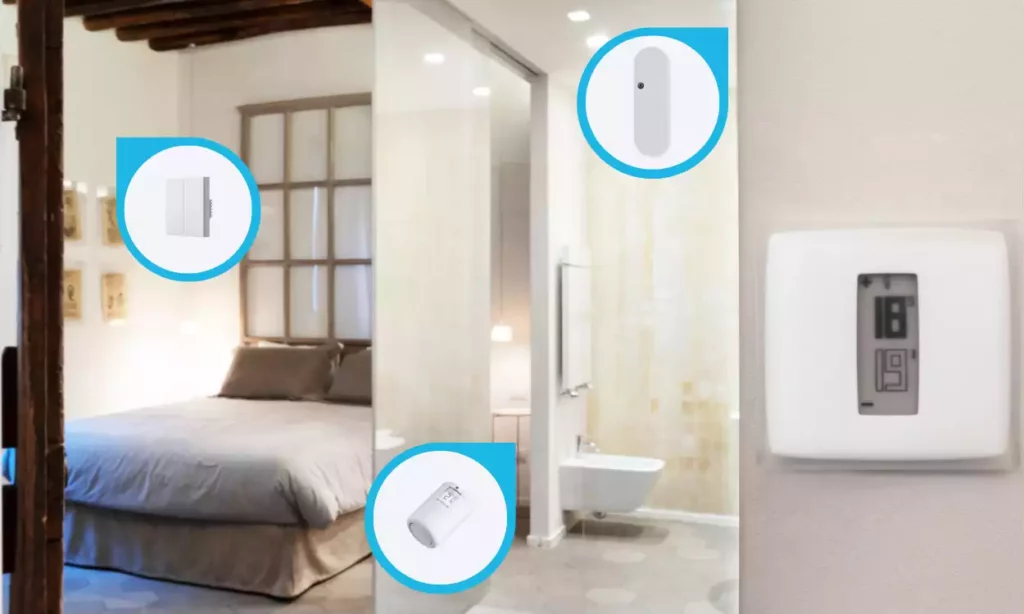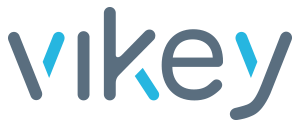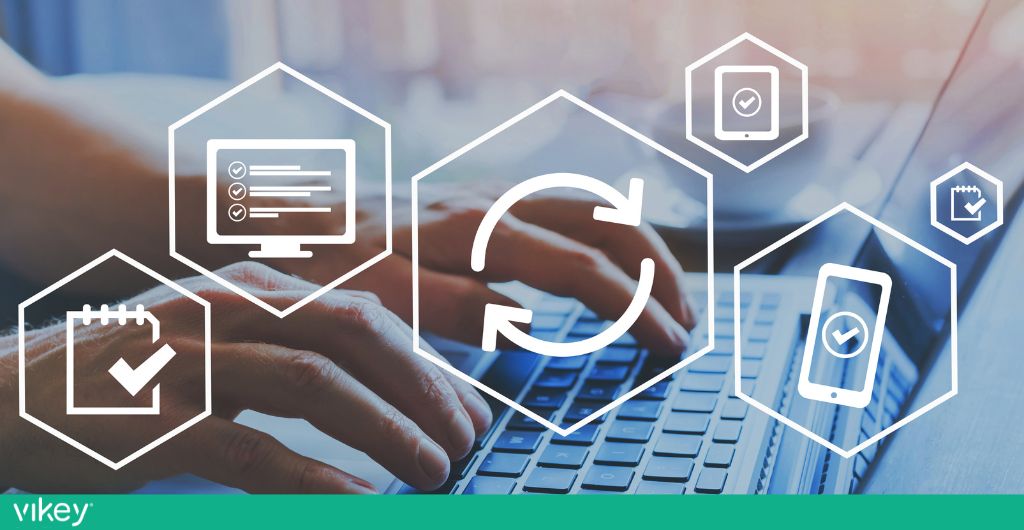Hotel room automation software offers numerous benefits for accommodation providers. Here’s everything you need to know about the advantages:
In the constantly evolving hospitality industry, hotel room automation software has emerged as a key player in helping accommodation providers remain competitive and efficient. From simplifying and automating operations to enhancing the guest experience, automation software, also known as home automation software, domotics software, or self-check-in software, has proven to be a valuable resource for hotels of all sizes.
However, automation in the hospitality sector is not about replacing human employees. Hotel automation integrates the human touch, allowing collaboration towards common goals to make operations more efficient, saving time and costs, and increasing guest satisfaction.
If you are about to start a hotel business and are seeking the right solution to manage check-in processes and energy control, or if you are already a hotel owner or manager but currently handle all activities in a traditional manner, this article will help you understand how to choose and make the best use of automation software.
How to choose the best hotel automation software
Selecting the best automation software for hotel rooms requires careful consideration of various factors. These software solutions eliminate many routine operations and, when equipped with the available home automation and access devices on the market, can enhance customer service and communication with guests. Domotics systems that control lights, air conditioning, thermostats, and humidity make the hotel more efficient, while remote door opening systems facilitate operations for both the owner and the guest.
However, each property has different needs based on its target audience, the number of rooms, and other specific requirements. Let’s explore how to select the right automation software for your hotel
It must fit exactly to the business needs
Depending on the type and size of the hotel, the requirements for an automation software can vary greatly.
- Tailored to your business needs: Depending on the type and size of the hotel, the requirements for automation software can vary significantly. It’s important to consider factors such as the property size, budget, and specific needs. For instance, Vikey offers a complimentary site visit to assess the best solutions for your property.
- Comprehensive functionality: Evaluate the features and capabilities of the automation software. Look for features such as remote control of room devices, seamless integration with existing systems, guest communication tools, energy management capabilities, and reporting and analytics functionalities. Ensure that the software provides the necessary tools to streamline operations and enhance the guest experience.
- Scalability and flexibility: Choose a software solution that can adapt and scale as your business grows. It should be flexible enough to accommodate changes in room configurations, accommodate future technological advancements, and integrate with other hotel management systems.
- User-friendly interface: The software should have an intuitive and user-friendly interface that simplifies operations and reduces the learning curve for staff. A clean and well-designed interface will contribute to the efficient use of the software and enhance productivity.
- Reliability and support: Consider the reputation and track record of the software provider. Ensure that they offer reliable technical support and regular software updates to address any issues or security vulnerabilities that may arise.
- Integration capabilities: Check if the automation software can integrate with other hotel systems, such as property management systems (PMS), booking engines, or channel managers. Seamless integration allows for smoother operations and data synchronization across different platforms.
- Cost-effectiveness: Evaluate the cost of the software, including any upfront fees, ongoing subscription costs, and potential additional charges for customization or support. Consider the value the software provides in terms of increased efficiency, guest satisfaction, and cost savings.
By carefully considering these factors and conducting thorough research, you can select the automation software that aligns with your hotel’s specific needs, enhances operations, and delivers an exceptional guest experience.
It Must have a transparent pricing plan
It is important for the automation software to have a transparent pricing plan. Hotel room automation software utilizes advanced systems to control lights, access, climate, consumption, and noise levels through an integrated hardware and software solution. This allows for monitoring and control of every aspect of guest hospitality, even remotely, maximizing comfort and safety while ensuring significant management savings. The costs should be based on the number of rooms, and there should be options for monthly subscriptions that may or may not include a range of additional features. It is essential that the conditions for subscription cancellation are clearly stated.
For example, in the case of Vikey, starting from €12.90 per month per room, the host receives a complimentary central hub with a noise sensor, which enables control of home automation, electronic locks for self-check-in, online check-in, virtual reception with a digital concierge, and 24/7 assistance.
A noteworthy aspect is the ability to customize services, including the option to purchase individual home automation devices. These devices have a list price, with some exceptions like thermostats, which range from €20 to €40 + VAT each.
It Must have a user-friendly interface, easy to use
A user-friendly interface is crucial for hotel automation software, as it should be intuitive and easy to use, allowing employees to navigate it without difficulty or making mistakes. Vikey devices and user interfaces, such as the web app for access control, are designed to be very user-friendly and intuitive, accessible to all. Vikey’s self-check-in feature includes various backup systems that allow even less tech-savvy users to utilize it, such as remote access managed by the host, code-based entry, smart cards, and backup keys.
Which activities are worth automating with the software?
Check-in Process
Enabling self-check-in is a beneficial solution for both hotel management and guests. Self-check-in allows guests to access their rooms without interacting with a receptionist.
With self-check-in, it becomes possible to remotely manage guest arrivals through a range of fully digitizable functions. With self-check-in, you can:
- Complete the check-in process online immediately after the booking.
- Collect necessary guest data in advance for automatic submission to local authorities and accommodation portals.
- Send and process payments.
- Digitally sign the rental agreement with customers.
- Offer additional services and experiences to increase revenue.
Guest Assistance
Most guest communications involve answering frequently asked questions. Implementing a digital concierge and virtual reception can provide quick responses to guests, allowing staff to focus on more important tasks that require a personal touch. The team can still be involved in addressing more complex inquiries that go beyond the programmed capabilities of an app.

By automating the check-in process and providing digital assistance, hotels can streamline operations, enhance guest experiences, and optimize staff resources. A user-friendly interface ensures that both employees and guests can easily navigate the software, contributing to a seamless and efficient workflow.
Automating hotel rooms
By installing smart sensors to detect guest movements and remotely control lighting and air conditioning systems can help hotels save energy. Real-time temperature and humidity sensors can monitor environmental conditions and automatically adjust humidity levels when used in conjunction with a smart plug and humidifier. This investment significantly contributes to long-term energy cost reduction, leading to substantial savings on utility bills.
How does air conditioning control work?
Thanks to home automation, you can set up an automatic rule that turns off the air conditioning when guests leave the room. Here’s how it works:
- The presence sensor, adjustable in minutes, detects whether guests are present in the room or not.
- The presence sensor communicates via Bluetooth with the central device Vikey4, which is connected to Wi-Fi and can be controlled remotely.
- The Vikey4 device commands the air conditioning sensor and, acting as a replacement for the remote control, turns off the air conditioning.
In addition to cost reduction in terms of energy efficiency, it is crucial not to underestimate the home automation devices that enhance the security of hotel rooms, such as smoke detectors and water leak sensors. The smoke detector immediately alerts of a fire, while the water leak sensor detects any water leaks and automatically sends a notification, preventing the risk of flooding.
Regardless of the type of property, size, or star rating, automating access, implementing energy-saving policies, and managing the property remotely bring immediate benefits and allow for a return on investment in a few years.

